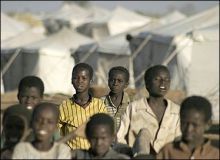Arab refugees seek return to torched Darfur villages
By Opheera McDoom
BARAKALLAH, Sudan, May 15 (Reuters) – Hafez Ali was awakened by shooting and bombs raining down on his village in Sudan’s Darfur region. He grabbed his two young boys and ran for his life.

|
|
Sudanese displaced children gather outside their tents in Sudan’s southern Darfur region in 2004. (AFP) . |
Two years later, as dusk falls over the valley dotted with trees and shrubs, Ali sadly points out his burnt shell of a home in the village of Barakallah, in North Darfur.
“I ran to get help and could see people, my family, being gunned down in front of my eyes,” he said. “They came in 23 cars, took over and set up in the school as their base.”
Stories like Ali’s are repeated often in the remote region, where war has forced two million people from their homes.
In two years of open revolt, more than 500 villages have been burnt. Most of the reported attacks are on non-Arab farming villages and blamed on Arab Janjaweed militia.
But Ali was not fleeing the Janjaweed, or the government forces who are accused of backing them. He is Arab and says his and 12 other villages were attacked by mostly non-Arab rebels.
Darfur has been plagued by years of conflict between Arab nomadic tribes and non-Arab farmers over scarce resources. Weapons became more readily available in the past 20 years as uprisings in neighbouring Chad were planned and fought from Darfur, a vast region the size of France.
Ali said rebels launched their attacks from a nearby army base they had occupied a few weeks previously. They killed 18 people, all civilians, he said.
“I came back with some from our tribe who are armed and we fought them until 2 a.m. before they gave up.”
Ali said they didn’t return home because rebels threatened to again attack villages in Mistiriyha, the heartland of the powerful Arab Rizeigat tribe, of which Musa Hilal is the chief.
Hilal is accused by the United States of leading the Janjaweed militia, which the United Nations says has conducted a campaign of killing, looting and rape in non-Arab villages across Darfur, a charge the Arab chief denies.
RETURN IN THE WINTER
Tens of thousands have been killed in fighting between government forces and their allied militias and the rebels, who say Khartoum has neglected their people and has given preferential treatment to Arab tribes.
All the homes in Barakallah were destroyed, with the blackened remains of pots and pans still lying in the remains of the huts.
“We will return during the winter when we can get the straw materials to rebuild our homes,” he said. “My grandfather founded this village — I will come back.”
The 1,000 or so residents of Barakallah did not flee to miserable camps like the majority of the non-Arabs who had their villages destroyed, but went to neighbouring villages and set up tents next to their relatives.
Ali no longer fears the rebels whose nearest bases he says are now about 200 km (125 miles) to the north. But the non-Arabs in camps are more reluctant to return home as they still live in fear of attacks by Arab militias.
Rights groups have accused the government and allied militias of a campaign of ethnic cleansing against the non-Arab tribes of Darfur, which Khartoum denies. The United States said they were responsible for genocide in the region.
But Ali said the rebels began targeting Arabs first, heightening tensions between Arabs and non-Arabs and escalating skirmishes over resources between the nomads and farmers.
HILAL PREACHES PEACE
U.N. sources say Hilal is likely to be on a list of 51 government, militia and rebel leaders suspected of crimes against humanity in Darfur which was handed to the International Criminal Court last month.
Like Ali, he blames the war on non-Arab rebels and is now portraying himself as a man of peace, touring Darfur to try to unite rival tribes, using the old traditions of dialogue.
“We have left the stage of war now and we are entering the stage of peace,” Hilal said. He said he had direct contacts with the rebel leaders, personally meeting the head of the rebel Justice and Equality Movement (JEM) Khalil Ibrahim in Libya a few months ago for more than four hours.
“They are all the sons of the region and we have always had contacts with them and these will continue,” he said.
Hilal has brought on board sheikhs from the largest non-Arab tribe, the Fur, in his peace initiative — which he says will enhance, not replace talks between rebels and the government in Nigeria, which are due to restart at the end of May.
Reconciliation will not be easy. The leader of the main rebel group, the Sudan Liberation Movement, also a Fur chief, has rejected Hilal’s efforts to persuade refugees to return home with offers of money and better security.
